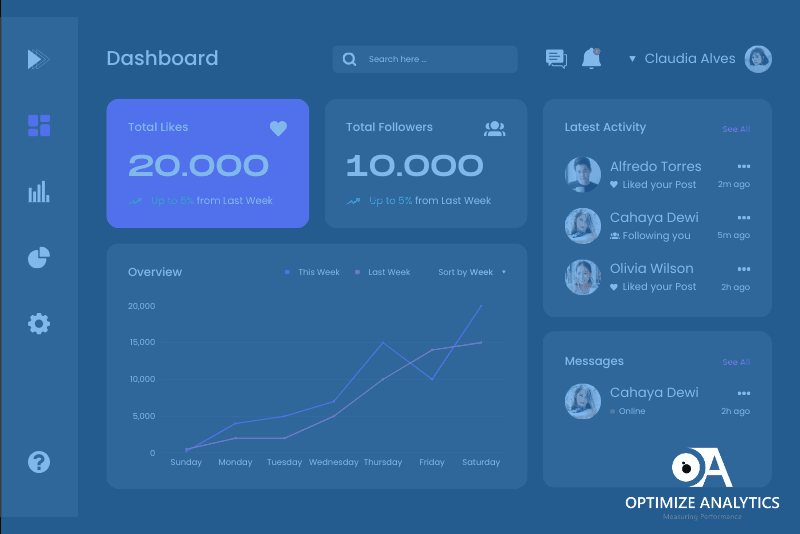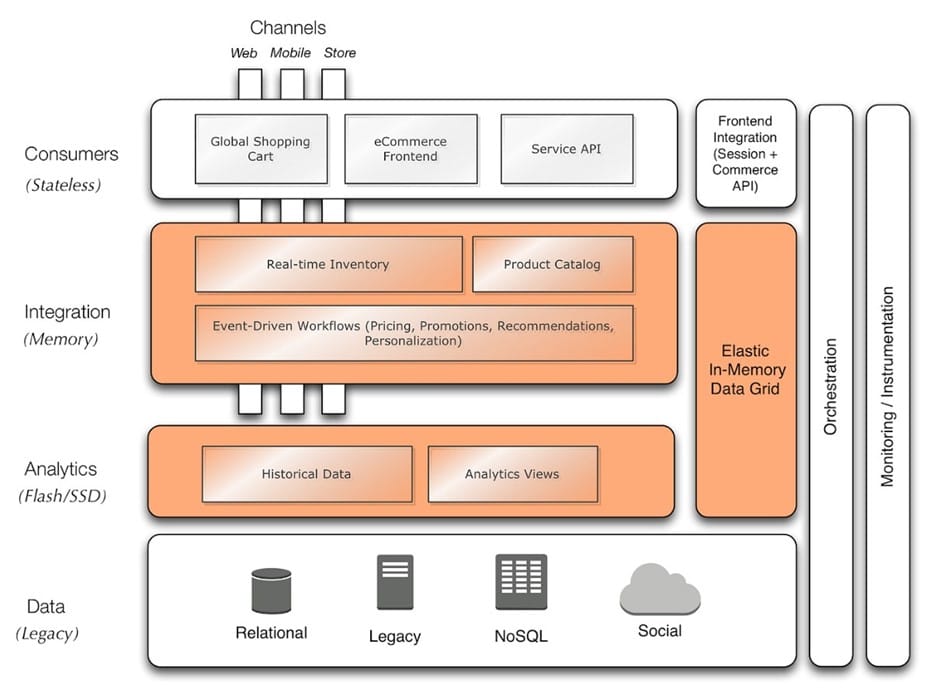Unlocking the Power of OMNI Channel Marketing: Maximize Reach & Sales!

In today’s rapidly evolving digital landscape, businesses are constantly searching for innovative marketing strategies to stay ahead of the competition. One approach that has proven to be highly effective is OMNI Channel Marketing. By effortlessly integrating multiple channels and providing a consistent customer experience, OMNI Channel Marketing offers remarkable benefits that can significantly impact a company’s reach and sales.
What is OMNI Channel Marketing
OMNI Channel Marketing can be defined as a holistic approach to marketing that integrates multiple channels and touchpoints to provide a seamless and consistent customer experience. It involves aligning messaging, branding, and customer interactions across various online and offline channels, allowing customers to interact with a brand through their preferred methods of communication.

The key distinction between OMNI Channel and multichannel marketing is the emphasis on integration and consistency. While multichannel marketing focuses on using multiple channels independently to reach customers, OMNI Channel Marketing ensures that all channels work together harmoniously to provide a unified brand experience.
Importance of OMNI Channel Marketing
The importance of using OMNI channel marketing is described below:
Enhanced Customer Experience
OMNI Channel Marketing puts the customer at the center by offering a cohesive, personalized experience across channels. Customers can seamlessly transition between channels without disruption, enjoying a consistent brand message and a smooth buying journey. This improved experience leads to higher customer satisfaction and increased loyalty.
Expanded Reach
By leveraging multiple channels, businesses can reach a broader audience. Different customers have different preferences when it comes to communication channels, and by being present across various platforms, businesses can connect with potential customers on their preferred channels, increasing brand visibility and exposure.
Increased Engagement
OMNI Channel Marketing provides opportunities for deeper customer engagement. By utilizing multiple touchpoints, businesses can interact with customers at various stages of the buying process. Whether through social media interactions, personalized emails, or in-store experiences, businesses can engage customers in meaningful ways, fostering stronger relationships and driving higher levels of engagement.
Improved Sales and Conversions
OMNI Channel Marketing facilitates a seamless and convenient buying process for customers. By offering multiple channels for research, product discovery, and purchasing, businesses can remove barriers and friction points, increasing the likelihood of conversion. Moreover, businesses can build trust and credibility by providing a consistent experience across channels, further boosting sales and conversions.
Data-Driven Insights
OMNI Channel Marketing generates a wealth of data from various channels and touchpoints. By collecting and analyzing this data, businesses can gain valuable insights into customer behaviors, preferences, and interactions. These insights can inform marketing strategies, enabling businesses to optimize their campaigns, personalize messaging, and make data-driven decisions for better targeting and improved results.
Understanding OMNI Channel Marketing
To fully grasp the power of OMNI Channel Marketing, it’s essential to understand its key concepts and components. OMNI Channel Marketing utilizes various channels such as websites, mobile apps, social media platforms, email, physical stores, and more to create a cohesive and integrated customer experience.
Key Concepts and Components
- Multiple Channels: OMNI Channel Marketing revolves around the idea of utilizing multiple channels to reach and engage customers. These channels can include websites, mobile apps, social media platforms, email marketing, physical stores, call centers, and more. The goal is to provide customers with a choice of channels that best suit their preferences and enable a seamless experience.
- Customer-Centric Approach: At the core of OMNI Channel Marketing is a customer-centric mindset. It focuses on understanding customer needs, preferences, and behaviors across channels. Businesses can tailor their strategies and messaging to deliver a personalized and relevant experience by gaining insights into customer interactions.
- Channel Integration: Integration is a vital aspect of OMNI Channel Marketing. It involves connecting and synchronizing various channels to ensure a consistent and seamless customer journey. The integration allows customers to switch between channels effortlessly, with their data and preferences carried forward. For example, a customer might start browsing products on a mobile app and later continue the purchase process on a website without losing their shopping cart items.
- Data Connectivity: OMNI Channel Marketing relies on data connectivity to provide a unified customer experience. By linking customer data from different channels, businesses can gain a holistic view of their customers and their interactions. This data connectivity enables personalized messaging, targeted promotions, and a better understanding of customer preferences and behaviors.
- Customer Journey Mapping: Understanding the customer journey is crucial in OMNI Channel Marketing. It involves mapping out the various touchpoints and customer interactions with a brand across channels. By analyzing the customer journey, businesses can identify pain points, opportunities for improvement, and areas where channels can complement each other to create a cohesive experience.
Role of Integration and Consistency
Integration and consistency are fundamental to the success of OMNI Channel Marketing. Here’s why they play a significant role:
- Seamless Experience: Integration ensures a seamless experience for customers as they move between channels. It eliminates the need for customers to restart their interactions or provide redundant information when switching channels. A consistent experience across channels builds trust, reduces friction, and enhances the overall customer journey.
- Unified Brand Image: OMNI Channel Marketing aims to maintain a consistent brand image and messaging across all channels. Consistency in branding, visuals, and tone of voice reinforces brand identity and helps customers recognize and relate to the brand. This unified brand image fosters familiarity and trust, which are crucial for building strong customer relationships.
- Data Consistency and Insights: Integration allows for collecting and sharing customer data across channels. Consistent data enables businesses to understand customer behavior and preferences comprehensively. It also ensures accurate and reliable data for analysis and decision-making. Integrated data leads to valuable insights that help optimize marketing strategies, personalize messaging, and improve targeting.
- Holistic Customer Engagement: Integration and consistency enable businesses to engage customers holistically. By providing a unified experience, businesses can deliver relevant messages, promotions, and recommendations across channels. This personalized engagement increases customer satisfaction, encourages loyalty, and strengthens the overall relationship between the customer and the brand.
- Efficiency and Resource Optimization: Integration streamlines marketing operations and resource allocation. By integrating data and systems, businesses can avoid duplication of efforts and ensure efficient use of resources. For example, customer data shared across channels can eliminate the need for redundant data entry or separate marketing campaigns for each channel. This optimization improves operational efficiency and reduces costs.
Expanding Reach and Customer Engagement
A significant advantage of OMNI Channel Marketing is reaching a broader audience. By leveraging multiple channels, businesses can tap into different customer segments and increase their visibility. For example, a customer may discover a brand through social media, engage further by visiting their website, and eventually make a purchase in-store. This multichannel approach maximizes opportunities to connect with potential customers at various touch points along their journey.
Furthermore, OMNI Channel Marketing enhances customer engagement by offering diverse touchpoints. Whether it’s personalized emails, interactive social media campaigns, or immersive website experiences, each channel serves as an opportunity to engage customers meaningfully, fostering brand loyalty and advocacy.
Driving Sales and Conversions
OMNI Channel Marketing significantly impacts a company’s bottom line by increasing sales opportunities. By providing customers with the convenience of purchasing through multiple channels, businesses can meet customers where they are and make it easy for them to complete a transaction. For instance, customers can seamlessly switch between online browsing and in-store purchasing or vice versa, ensuring a frictionless buying experience.
Moreover, OMNI Channel Marketing encourages seamless customer journeys. Customers might browse products on a mobile app, save items to their cart, and later receive a personalized email reminding them to complete their purchase. By integrating channels and enabling a consistent experience, businesses can reduce cart abandonment rates and boost conversions.
Creating Personalized Experiences
One of the key benefits of OMNI Channel Marketing is the ability to create personalized experiences for customers. Personalization involves customizing marketing efforts and messages to align with individual customer preferences, behaviors, and needs. Here’s an explanation of how OMNI Channel Marketing achieves personalization:
- Customer Data Collection: OMNI Channel Marketing gathers customer data from various touchpoints and channels. This data includes demographic information, purchase history, browsing behavior, interactions with the brand, and preferences indicated by customers themselves. Collecting comprehensive data allows businesses to gain insights into individual customers and create detailed customer profiles.
- Segmentation and Targeting: With the customer data collected, businesses can segment their audience into distinct groups based on common characteristics, behaviors, or preferences. Segmentation allows for more precise targeting and enables marketers to deliver relevant messages to specific customer segments. For example, customers interested in a particular product category can receive tailored promotions related to their preferences.
- Personalized Messaging: OMNI Channel Marketing enables businesses to send personalized messages to customers across different channels. Whether through email, mobile notifications, social media ads, or website recommendations, personalized messaging speaks directly to each customer’s preferences and needs. Personalization can include addressing customers by name, recommending products based on their previous purchases, or providing tailored content based on their interests.
- Dynamic Content and Offers: OMNI Channel Marketing leverages automation and technology to deliver dynamic content and offers. Dynamic content adjusts in real time based on customer data and actions. For instance, a website might display product recommendations based on the customer’s browsing history, or an email might showcase specific offers tailored to the customer’s preferences. These dynamic elements make the customer experience more relevant and engaging.
- Leveraging Data for Insights and Optimization: Data lies at the heart of OMNI Channel Marketing’s success. Businesses can gain actionable insights into their marketing efforts by leveraging analytics tools and collecting data from various channels. Analyzing customer interactions, campaign performance, and sales data provides valuable information for optimizing marketing strategies. Data-driven decisions enable businesses to identify areas of improvement, refine their messaging, and allocate resources effectively. Whether it’s identifying the most effective channels for customer acquisition or understanding the customer journey from initial touchpoint to conversion, data empowers businesses to make informed decisions and continually optimize their marketing strategies.
Overcoming Challenges and Implementing OMNI Channel Marketing
While the benefits of OMNI Channel Marketing are clear, implementing this strategy can present challenges. It’s essential to address common obstacles to ensure successful implementation. Some challenges include:
- Channel Integration: Integrating various channels seamlessly can be complex. It requires robust technological infrastructure and a well-defined strategy to synchronize data and messaging across channels.
- Consistent Branding: Maintaining a consistent brand image and messaging across multiple channels can be a challenge. Businesses must establish brand guidelines and ensure all touchpoints align with the brand’s voice and values.
- Data Management: Managing and analyzing data from multiple channels can be overwhelming. Implementing robust data management systems and leveraging analytics tools is crucial for extracting meaningful insights.
- Resource Allocation: OMNI Channel Marketing may require additional resources, both in terms of technology and personnel. Businesses need to allocate resources effectively to support the implementation and ongoing management of multiple channels. To overcome these challenges, it’s important to follow the best practices:
- Develop a Clear Strategy: Outline a comprehensive strategy that aligns with your business goals, identifies target audiences, and defines key performance indicators (KPIs).
- Invest in Technology: Implement a robust technological infrastructure that enables seamless integration, data collection, and analysis across channels.
- Prioritize Consistency: Establish brand guidelines and ensure a consistent brand experience across all touchpoints, including messaging, visuals, and customer interactions.
- Focus on Data Governance: Implement proper data governance practices to ensure data accuracy, security, and compliance with relevant regulations.
- Test and Iterate: Continuously monitor and analyze performance metrics to identify areas for improvement. Test different approaches and iterate based on data-driven insights.
OMNI Channel Integrations Tools
Several tools and platforms offer OMNI Channel integrations to support businesses in implementing and managing their OMNI Channel Marketing strategies:
Salesforce Marketing Cloud
Salesforce Marketing Cloud offers a suite of tools for personalized and cross-channel marketing, including email marketing, mobile messaging, social media marketing, and more. It enables businesses to create integrated campaigns and deliver consistent messages to customers across various channels.
Adobe Experience Cloud
Adobe Experience Cloud provides a comprehensive set of marketing solutions, including Adobe Campaign, Adobe Analytics, and Adobe Target. These tools enable businesses to deliver personalized content, optimize customer experiences, and analyze marketing performance across different channels.
Google Marketing Platform
Google Marketing Platform offers a range of tools for digital marketing, including Google Analytics, Google Ads, and Google Tag Manager. These tools allow businesses to track customer interactions, run targeted advertising campaigns, and optimize their marketing efforts across Google’s advertising and analytics ecosystem.
Final Words
In conclusion, OMNI Channel Marketing presents a multitude of benefits that can significantly impact businesses. By tailoring marketing efforts to individual customer preferences, companies can create personalized experiences that enhance customer satisfaction and foster loyalty. Adopting OMNI Channel Marketing strategies allows businesses to maximize their reach by engaging customers across multiple channels. This comprehensive approach drives sales and empowers businesses to leverage data-driven insights for continuous optimization. Embracing OMNI Channel Marketing is crucial for companies aiming to maximize their marketing efforts and thrive in today’s competitive landscape.
